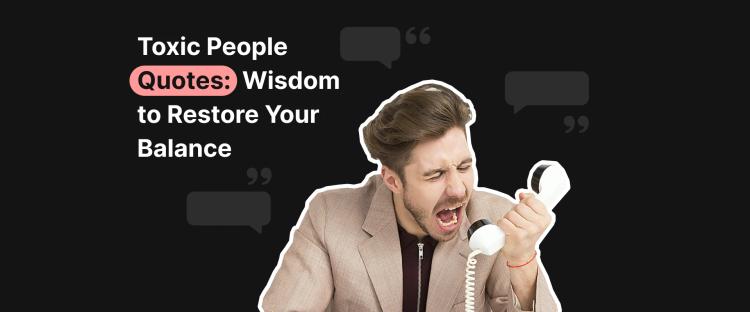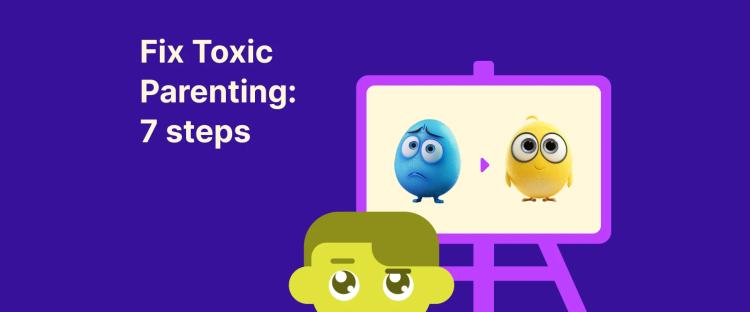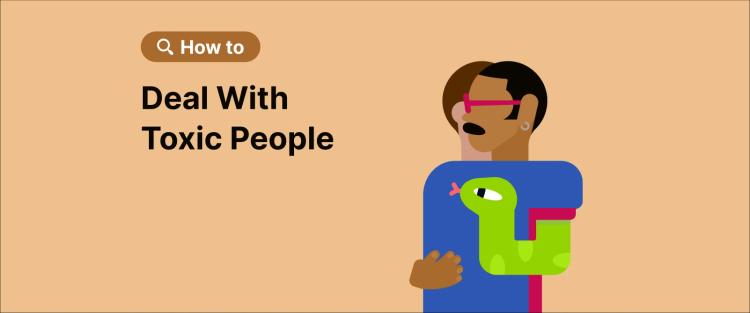Do you ever feel completely drained, emotionally exhausted, or deflated after spending time in someone's company? Are you wondering whether it’s time to start letting go of the toxic people in your life? It may feel like they sucked "the life out of you." Perhaps you have heard the term "energy vampire." If you resonate with that feeling or have identified a relationship that fits this description, read on.
Letting go of toxic people is never easy, especially when the relationship once felt meaningful or necessary. Sometimes, we sense that a friendship or connection isn't working. It's like an itch in the back of your mind you can't quite reach. Maybe you don't know why, or maybe deep down, you already do.
Toxic relationships don't always start out that way. Some shift slowly — what once felt like care turns into control, and concern masks manipulation. You may have excused the behavior or missed the early signs: being "overprotective," always critical, or draining to be around.
This article will help you identify toxic traits and red flags, set boundaries, and take steps toward letting go of toxic people, so you can protect your well-being and rebuild healthier, more supportive relationships.
Quick steps to let go of a toxic person
Set clear emotional and physical boundaries.
Limit or cut off all contact.
Focus on your mental health and self-worth.
Seek support from a therapist or life coach.
Avoid engaging through social media.
Reflect through journaling or mindfulness.
Rebuild with safe, supportive relationships.
What are toxic relationships, and how can you recognize them?
Toxic relationships are often hard to spot at first. You may feel unsettled, like something is off, but you can't quite name it, or it might start as a small discomfort that slowly grows. Over time, the signs become clearer.
What makes it difficult is that the relationship may have once felt meaningful, even essential. Perhaps the toxic behaviors were disguised as "just caring too much" or being "overprotective." You might have overlooked them or made excuses because of how much you valued the person.
But recognizing these patterns is essential. In this section, we'll explore the most common traits of toxic individuals — and help you determine whether someone in your life is affecting your well-being more than supporting it.
Signs of toxic behavior to be aware of
Toxic people often exhibit certain recurring behaviours or traits that can make a relationship unhealthy. These behaviours may include:
Manipulation: They twist situations to their advantage, often making you feel guilty or responsible for their happiness. You might feel like "everything" is your fault. Nothing you do is ever good enough, and they find fault in situations/events that you attend together.
Chronic negativity: Constant complaining, criticism, or a general pessimistic attitude that drains your emotional energy. You might feel embarrassed by their comments toward you or others, or even guilted into trying to find a solution to halt their negativity.
Lack of empathy: An inability or unwillingness to recognize or care about your feelings or those of others.
Control and domination: They attempt to dictate your actions, choices, or social interactions with others. It's as if they hate to see you enjoying yourself. You may feel bad about having other friends and hobbies that do not include them.
Gaslighting: They make you question your own reality, memory, or perceptions. Even if you know you are "right," you might feel like agreeing with them is easier than standing up for yourself.
Emotional volatility: They often have unpredictable mood swings that keep you walking on eggshells. You dread meeting or upsetting them as you just don't know which way the interaction will go.
Excessive jealousy or possessiveness: Overbearing suspicion and insecurity, often leading to guilt-tripping or accusations. You feel that you cannot discuss achievements or problems outside of the relationship.
Many toxic behaviors — from gaslighting to emotional control — can make you question your own reality. In 'Get Out of Your Head,' Jennie Allen emphasizes how our thoughts shape our experience, and that awareness can help break the mental loops that keep us stuck in harmful dynamics.
Am I in a toxic relationship? Key questions to ask yourself
Self-reflection is not easy, but it is essential to take an honest look at your relationships. Ask yourself the following questions and answer them honestly. Take your time, reflect on the relationship, and notice what feelings arise in your body, mind, and soul.
Do I feel emotionally drained after spending time with this person?
Do I often feel anxious, guilty, or inadequate around them?
Am I constantly giving while receiving little support or kindness in return?
Do they respect my boundaries and opinions?
Are the conversations always one-sided, and are my feelings dismissed?
When we are aware of how the relationship makes us feel and recognize toxic patterns, it’s the first step toward change.
Five steps to emotionally let go of someone toxic
If you’ve identified a relationship that is no longer serving you and it’s damaging to your health and well-being, it’s vital to take actionable steps to rectify the situation. Remember, you will never soar by remaining small and insignificant. You must transition, just as caterpillars change into beautiful butterflies, you too can soar upward and move forward to bigger and better relationships.

1. Set clear boundaries for your own well-being
Take time to analyse the situation and establish clear, firm boundaries. Communicate your limits calmly but assertively — for example:
"I'm not comfortable discussing that topic. Can we discuss x instead?"
"Please don't raise your voice when speaking to me."
"I need some time to focus on myself right now."
"How would you feel if we discussed my hopes and dreams?"
Remember, boundaries protect your emotional space — they are not a punishment for the other person.
2. Reduce contact with the toxic person
If you're not ready to completely cut ties, start by minimizing your interactions. This might involve:
Becoming less available
Limiting phone calls and messages
Politely declining invitations
Spending less time in shared spaces
3. Seek professional and friendly support
Letting go of a toxic person is difficult, and having a strong support system can make all the difference:
Read books and listen to motivational self-help podcasts, TED talks, and interviews. These will invigorate and motivate you to continue with your actions. They will also inspire you to find new ways of communicating and new people to interact with, while also changing your mindset and helping you develop self-worth.
Talk to your best friend and family members and ask for support in your decision.
Support groups help you connect with others who've experienced similar situations. This can be incredibly validating, and you can learn from their situation.
Therapists or counselors provide unbiased, professional guidance and can provide valuable tools, coping mechanisms, and help you remain true to your new boundaries and behavioral patterns.
4. Make the decision to cut ties
Sometimes, walking away is the healthiest choice — especially when the toxic individual refuses to acknowledge or change harmful behaviour. When deciding to cut ties:
Reflect on your reasons: Write down why the relationship is unhealthy to remind yourself when doubts arise.
Choose an appropriate method: If safety isn't a concern, have an honest, respectful conversation. Otherwise, a gradual fade or even a clean break may be necessary.
Stick to your decision: Feelings of guilt or nostalgia may surface, but remind yourself why you made this choice.
5. Heal and move forward
After leaving a toxic relationship, focus on healing and rebuilding your sense of self. Consider these self-care practices:
Journaling: Reflect on your experiences, emotions, and personal growth.
Exercise: Physical activity helps release endorphins, improving mood and reducing stress.
Meditation and mindfulness: Reconnect with yourself and regain emotional balance.
Creative outlets: Art, music, or other hobbies can be therapeutic.
Positive affirmations: Reinforce your self-worth and resilience.
Find your tribe: Taking up new hobbies and sports can help to distract you, but more importantly, it will broaden your circle and allow you to meet new people.
Once you're ready to connect with others again, prioritize and build healthy relationships that offer mutual respect, trust, and empathy. Once you're ready to reconnect with others, look for signs of mutual respect, empathy, and trust. 'Relationship Goals' by Michael Todd offers a refreshing, grounded perspective on what healthy love and spiritual connection should look like — whether you're rebuilding friendships, dating, or nurturing family ties.
Look for people who:
Listen without judgment
Respect your boundaries
Celebrate your successes
Support you through challenges.
The impact of toxic relationships on mental and emotional well-being
Long-term exposure to toxic relationships can take a severe toll on your mental and emotional state. Your overall well-being may be compromised, and you may notice that you have some or all of these common side effects:

Increased stress and anxiety: Constant tension can lead to chronic stress, leaving you feeling overwhelmed and mentally exhausted. You may start overeating, drinking more alcohol, or find other unhealthy ways to "self-soothe."
Low self-esteem: Continuous criticism or belittling can make you doubt your worth and abilities. You may start to believe that they are right about you, which can lead you into a downward spiral.
Depression: Feeling trapped in an unhealthy relationship can foster hopelessness and sadness. Very often, we don’t want to discuss our feelings with others, especially mutual friends or acquaintances.
Emotional dependency: Some toxic individuals create a cycle of highs and lows, making you feel dependent on them for validation. You may lose the ability to self-validate, or make positive choices for your life and career. Toxic dynamics can drain your energy, distort your self-worth, and leave you feeling emotionally exhausted. As Gabor Maté, MD, explores in 'The Myth of Normal,' the environments we accept as ordinary often hide deep emotional injuries, and recognizing those patterns is the first step toward healing.
The effect of toxic relationships on your physical health
Emotional turmoil can manifest physically. Prolonged exposure to stress from a toxic relationship may lead to:
Sleep disturbances like insomnia or oversleeping
Headaches or migraines
Weakened immune system, making you more prone to illnesses
Digestive issues due to chronic stress
Increased risk of heart disease from consistently high stress levels
Interactive tools to help you let go of toxic relationships
Letting go of someone toxic is easier said than done. So, I've collected several tools that will equip you for the task.
1. Self-assessment quiz
Take time to assess the health of your relationships with questions like:
Do I feel safe, supported, and valued in this relationship?
Does this person respect my boundaries and opinions?
Am I able to express myself without fear of judgment or backlash?
Do I leave interactions feeling drained or uplifted?
2. Journaling prompts
Reflect on your experiences with these prompts:
Describe a time when you felt hurt or unsupported in a relationship. How did you respond?
What makes this person worth the upset and pain they bring to your life?
What boundaries would you like to establish or strengthen?
How do you envision a healthy, supportive relationship?
Reflect, release, and reclaim your peace
Breaking free from toxic relationships is a courageous act of self-care and self-respect.
By recognizing harmful patterns, setting boundaries, and prioritizing your well-being, you create space for healing and more fulfilling connections.
A toxic person — whether a partner, friend, family member, or colleague — can drain your energy, lower your confidence, and hinder your personal growth. Recognizing this is painful, but it's essential to regaining control over your life.
You deserve relationships that uplift and support you, not ones that hold you back.
Be brave enough to assess your connections honestly and let go of the ones that no longer serve your well-being.
Learn to let go of toxic relationships with Headway summaries
Letting go is just the beginning — staying committed to your growth and healing is what comes next. For further guidance, explore detailed book summaries and self-improvement resources on the Headway app to continue your journey toward emotional freedom and well-being.
![]()
Here are three powerful reads we highly recommend:
'The Myth of Normal' by Gabor Maté, MD
Understand how emotional trauma and toxic environments impact your health and identity.
'Get Out of Your Head' by Jennie Allen
Learn how to interrupt toxic thought loops and reclaim control over your inner world.
'Relationship Goals' by Michael Todd
Discover what healthy love looks like and how to build relationships rooted in trust and respect.
Each summary is designed to empower you with knowledge, perspective, and clarity in just 15 minutes a day. Whether you're letting go, starting over, or learning to set new boundaries, Headway is here to support your growth — one insight at a time.
FAQs about letting go of toxic peopl
How can I stop obsessing over a toxic person?
Obsessing over a toxic person often comes from emotional abuse and broken self-worth. Limit contact, stay off social media, and focus on healing activities like journaling or therapy. Replace rumination with healthy distractions. Remind yourself daily that your peace matters more than their presence.
Why am I so attached to toxic people?
Toxic attachments can form when you confuse control for love, often rooted in past emotional abuse or patterns with toxic family members. If you grew up around narcissistic behavior, chaos may feel familiar. Healing begins when you see that love shouldn't hurt or confuse you.
How can I take my power back from a toxic person?
Taking your power back starts with setting firm boundaries and refusing to engage in narcissistic manipulation. Focus on your mental health and lean on a support system. A life coach can help you rebuild confidence, set clear goals, and reclaim your life.
How can I break a toxic attachment?
Breaking a toxic attachment takes space, time, and clarity. Distance yourself physically and emotionally — even if the person is a friend, partner, or co-worker. Narcissistic people may resist, but stay firm. Delete old messages, mute them on social media, and reconnect with things that make you feel safe.
Why is it so hard to cut off a toxic person?
It's hard because narcissistic people often mix kindness with control, leaving you confused and hopeful. If it's a partner or a toxic family member, guilt runs deep. But staying stuck damages your mental health. Choosing to leave is not selfish — it's necessary for healing and peace.













